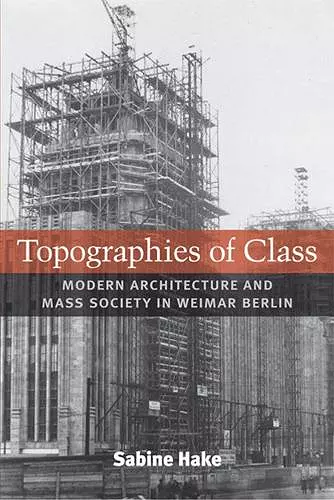Topographies of Class
Modern Architecture and Mass Society in Weimar Berlin
Format:Hardback
Publisher:The University of Michigan Press
Published:4th Aug '08
Currently unavailable, and unfortunately no date known when it will be back

In Topographies of Class, Sabine Hake explores why Weimar Berlin has had such a powerful hold on the urban imagination. Approaching Weimar architectural culture from the perspective of mass discourse and class analysis, Hake examines the way in which architectural projects; debates; and representations in literature, photography, and film played a key role in establishing the terms under which contemporaries made sense of the rise of white-collar society.
Focusing on the so-called stabilization period, Topographies of Class maps out complex relationships between modern architecture and mass society, from Martin Wagner's planning initiatives and Erich Mendelsohn's functionalist buildings, to the most famous Berlin texts of the period, Alfred Döblin's city novel Berlin Alexanderplatz (1929) and Walter Ruttmann's city film Berlin, Symphony of the Big City (1927). Hake draws on critical, philosophical, literary, photographic, and filmic texts to reconstruct the urban imagination at a key point in the history of German modernity, making this the first study---in English or German---to take an interdisciplinary approach to the rich architectural culture of Weimar Berlin.
Sabine Hake is Professor and Texas Chair of German Literature and Culture at the University of Texas at Austin. She is the author of numerous books, including German National Cinema and Popular Cinema of the Third Reich.
Cover art: Construction of the Karstadt Department Store at Hermannplatz, Berlin-Neukölln. Courtesy Bildarchiv Preeussischer Kulturbesitz / Art Resource, NY
Hake covers a vast terrain with admirable expertise and poised judgment, great insight, and sophistication. In her brilliant readings of various debates on urban planning and representations of metropolitan life in literature, photo journalism, and film, Weimar Berlin emerges as the site where new configurations of class were architecturally and discursively contested and renegotiated. - Christian Rogowski, Chair of German, Amherst College
ISBN: 9780472070381
Dimensions: unknown
Weight: unknown
336 pages